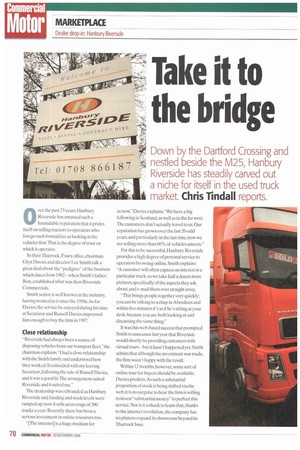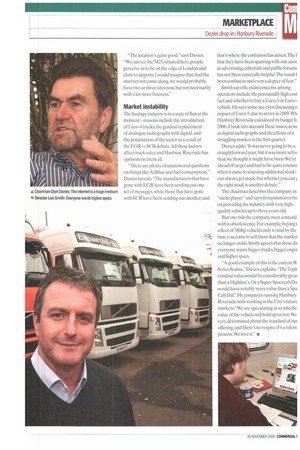Take it to „ the bridge
Page 72

Page 73

If you've noticed an error in this article please click here to report it so we can fix it.
Down by the Dartford Crossing and nestled beside the M25, Hanbury Riverside has steadily carved out a niche for itself in the used truck
market. Chris Tindall reports.
0 ver the past 25 years. Hanbury Riverside has amassed such a formidable reputation that it prides itself on selling tractors to operators who forego such formalities as looking at the vehicles first.That is the degree of trust on which it operates In their Thurrock, Essex office, chairman Glyn Davies and director Lee Smith talk a great deal about the "pedigree" of the business which dates from 1982—when Smith's father, Ron, established what was then Riverside commercials.
Smith senior is well known in the industry, having worked in it since the 1950s.As for Davies, the service he enjoyed during his time at Securicor and Russell Davies impressed him enough to buy the firm in 1997.
Close relationship
"Riverside had always been a source of disposing vehicles from our transport Heel," the chairman explains."I had a dose relationship with the Smith family and understood how they worked. It coincided with my leaving Securicor, following the sale of Russell Davies, and it was a good fit.The arrangement suited Riverside and it suited me."
The dealership was rebranded as Hanbury Riverside and funding and stock levels were ramped up; now it sells an average of 300 trucks a year. Recently there has been a serious investment in online resources too.
"[The internet] is a huge medium for LIS now," Davies explains."We have a big following in Scotland, as well as in the far west. The customers don't actually travel to us. Our reputation has grown over the last 20-odd years, and particularly in the last nine; now we are selling more than 60% of vehicles unseen."
For this to be successful, Hanbury Riverside provides a high degree of personal service to operators browsing online. Smith explains: "A customer will often express an interest in a particular truck, so we take half a dozen more pictures,specifically of the aspects they ask about, and e-mail them over straight away.
"This brings people together very quickly; you can be talking to a chap in Aberdeen and within five minutes it's as if he's sitting at your desk, because you are both looking at and discussing the same thing."
It was this web-bawd success that prompted Smith to announce last year that Riverside would shortly be providing customers with virtual tours — but it hasn't happened yet. Smith admits that although the investment was made, the firm wasn't happy with the result.
Within 12 months, however, some sort of online tour for buyers should be available, Davies predicts As such a substantial proportion of stock is being shifted via the web,it is no surprise to hear the firm is willing to invest"substantial money" to perfect this service. Nor is it a shock to learn that, thanks to the internet revolution, the company has no plans to expand its showroom beyond its Thurrock base. "The location's quite good," says Davies. "We can see the M25; situated here, people perceive us to be on the edge of London and close to airports I would imagine that, had the internet not come along, we would probably have two or three sites now, but not necessarily with a lot more business."
Market instability
The haulage industry is in a state of flux at the moment —reasons include the introduction of Euro-41 trucks, the gradual replacement of analogue tachographs with digital, and the polarisation of the sector as a result of the EGR vs SCR debate.All these factors affect truck sales,and Hanbury Riverside has opinions on them all.
"There are plenty of unanswered questions on things like AdBlue and fuel consumption," Davies reveals. -The manufacturers that have gone with EGR have been sending out one set of messages. while those that have gone with SCR have been sending out another, and that's where the confusion has arisen.The f that they have been sparring with one anot in advertising, editorials and public forums has not been especially helpful.The result I. been confusion and even a degree of fear."
Smith says the main concerns among operators include the perennially high cost fuel and whether to buy a Euro-3 or Euro-4 vehicle. He says some are even discussing ti impact of Euro-5, due to arrive in 2009.Wh Hanbury Riverside calculated its budget fc 2006, it took into account these issues, as w( as digital tachographs and the effects of a struggling market in the first quarter.
Davies adds:"It was never going to he a straightforward year. but it was more activ( than we thought it might have been.We're ahead of target and had to be quite resourc when it came to sourcing additional stock! can always get stock, but whether you can the right stock is another debate."
The chairman describes the company as -niche playerand says its reputation is bu on providing the industry with very highquality vehicles up to three years old.
But one risk the company must contend with is obsolescence. For example. buying i a fleet of 380hp vehicles only to find by the time you come to sell them that the market no longer exists.Smith agrees that these da everyone wants bigger trucks, bigger engin and higher specs.
-A good example of this is the current R Series Scania," Davies explains. -The Topli residual value would be considerably greal than a Highline's. Or a Super Spacecab Da would have notably more value than a Spa Cab Daf." He compares running Hanbury Riverside with working in the City's future markets:"We are speculating as to whethe value of the vehicle will hold up or not. We very determined about the standard of ow offering, and there's no respite; it's a relent process. We love it." s


















































































































































































